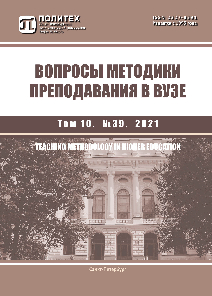Teaching Online Foreign language classes in the circumstances of mandatory transition to remote learning
This article focuses on the problems of design and implementation of foreign language classes in a non-linguistic university under the forced circumstances of transitioning to remote learning. The importance of this topic is related to the discussions of pros and cons of online education in social and mass media and its high demand in the future. The authors of this article analyze the features of online foreign language teaching, the role of the teacher and the student in the educational process, qualities of their interaction, altered methods and ways of teaching. Difficulties the teachers and students come upon during online education such as methodological, psychological, emotional, organizational, communicative, cognitive, etc. are discussed in this article. These determine the effectiveness of students’ learning. Based on their personal experience of using Microsoft Teams to teach students of the Graduate School of Management at the Saint Petersburg State University, the authors of this article evaluate its technical opportunities for solving certain tasks as an alternative to teaching a full size in-person foreign language class. From their personal observations the authors have formulated methodological recommendations for a more effective and intensive foreign language online class in a non-linguistic university. Besides using methodological strategies, online teaching requires technical skills and knowledge of psychological qualities of interacting with the audience. Among the effective ways of online teaching, special attention is paid to increasing students’ interest and motivation and their self-discipline. This article suggests certain ways of involving students in the educational process, stimulating their attention and increasing their self-discipline. In the conclusion, the authors give their experience in online foreign language teaching in a non-linguistic university a positive review; they agree with the idea that online education is becoming a part of traditional education, and they believe that elements of online education should be implemented in everyday practice of foreign language teaching for a more successful way of learning a language after transitioning back to traditional format of education.



